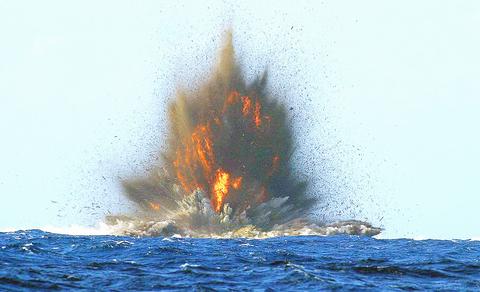Australia yesterday refused entry to a freighter carrying hundreds of mostly Afghan boat people, the first time it has turned back a ship carrying asylum seekers.
The Norwegian freighter, an unwitting player in the saga, rescued 434 people from a sinking ferry near Indonesia on Sunday. The asylum seekers forced the captain to go to Australia's Christmas island after some threatened to jump overboard.
Prime Minister John Howard made it clear he hoped the tough stance of refusing entry would send a clear message to a rising tide of illegal immigrants.

PHOTO: AFP
"We simply cannot allow a situation to develop where Australia is seen around the world as a country of easy destination," Howard told a news conference in Canberra.
In the past 11 days, more than 1,500 illegal immigrants have arrived in Australia. The country took in thousands of Vietnamese boat people in the late 1970s and 1980s.
The captain of the Norwegian-registered Tampa, Arne Rinnan, said the situation was calm on board and that he was awaiting orders on when to leave. But he wanted a doctor to attend to a few sick people first.
"We were disappointed we could not land in Australia because we expected to land these people this morning," Rinnan said from his ship. "Everything is calm at the moment because they can see Christmas Island. They haven't yet been told they will not be allowed to go to Australia."
Howard said Australia was acting within international law by handing the matter over to the governments of Indonesia and Norway to resolve. He said Australia would supply humanitarian aid to the ship, such as food, water and medical supplies.
No one at either embassy was immediately able for comment.
The boat people were rescued after their wooden ferry issued a distress signal.
The sinking boat was closest to the Indonesian port of Merak at the time and Indonesian authorities had started to prepare for their arrival, Australia said. Christmas island is 350km south of the Indonesian island of Java.
Rinnan, who was en route to Singapore, said he was forced to turn around when some of the boat people threatened to throw themselves overboard if he did not take them to Australia.
"I had five people [on the bridge] and they were talking in aggressive and highly excited voices and were severely threatening," Rinnan told Australian radio earlier.
Howard said this was not Australia's problem.
Refugee advocacy groups and human rights organizations condemned the decision to turn back the Tampa.
"To prevent people from seeking protection is something that is contrary to our [international], obligations," Margaret Piper, head of independent Refugee Council of Australia, said.
Howard, whose popularity has waned over the past year, faces a year-end election in which immigration is expected to be a major issue.
About 5,000 illegal immigrants arrive in Australia each year and the country is taking a hardline approach to what it terms "queue jumpers."
Indonesia said yesterday it would not allow the Tampa to enter its waters.
"The asylum seekers never have any intention of staying in Indonesia. We can't let the boat enter our waters, if they do we will have to evict them in accordance with procedures," said Navy spokesman First Admiral Franky Kayhatu.

CHAMPIONS: President Lai congratulated the players’ outstanding performance, cheering them for marking a new milestone in the nation’s baseball history Taiwan on Sunday won their first Little League Baseball World Series (LLBWS) title in 29 years, as Taipei’s Dong Yuan Elementary School defeated a team from Las Vegas 7-0 in the championship game in South Williamsport, Pennsylvania. It was Taiwan’s first championship in the annual tournament since 1996, ending a nearly three-decade drought. “It has been a very long time ... and we finally made it,” Taiwan manager Lai Min-nan (賴敏男) said after the game. Lai said he last managed a Dong Yuan team in at the South Williamsport in 2015, when they were eliminated after four games. “There is

Chinese Nationalist Party (KMT) lawmakers have declared they survived recall votes to remove them from office today, although official results are still pending as the vote counting continues. Although final tallies from the Central Election Commission (CEC) are still pending, preliminary results indicate that the recall campaigns against all seven KMT lawmakers have fallen short. As of 6:10 pm, Taichung Legislators Yen Kuan-heng (顏寬恒) and Yang Chiung-ying (楊瓊瓔), Hsinchu County Legislator Lin Szu-ming (林思銘), Nantou County Legislator Ma Wen-chun (馬文君) and New Taipei City Legislator Lo Ming-tsai (羅明才) had all announced they

Nvidia Corp CEO Jensen Huang (黃仁勳) yesterday visited Taiwan Semiconductor Manufacturing Co (TSMC, 台積電), as the chipmaker prepares for volume production of Nvidia’s next-generation artificial intelligence (AI) chips. It was Huang’s third trip to Taiwan this year, indicating that Nvidia’s supply chain is deeply connected to Taiwan. Its partners also include packager Siliconware Precision Industries Co (矽品精密) and server makers Hon Hai Precision Industry Co (鴻海精密) and Quanta Computer Inc (廣達). “My main purpose is to visit TSMC,” Huang said yesterday. “As you know, we have next-generation architecture called Rubin. Rubin is very advanced. We have now taped out six brand new

POWER PLANT POLL: The TPP said the number of ‘yes’ votes showed that the energy policy should be corrected, and the KMT said the result was a win for the people’s voice The government does not rule out advanced nuclear energy generation if it meets the government’s three prerequisites, President William Lai (賴清德) said last night after the number of votes in favor of restarting a nuclear power plant outnumbered the “no” votes in a referendum yesterday. The referendum failed to pass, despite getting more “yes” votes, as the Referendum Act (公民投票法) states that the vote would only pass if the votes in favor account for more than one-fourth of the total number of eligible voters and outnumber the opposing votes. Yesterday’s referendum question was: “Do you agree that the Ma-anshan Nuclear Power Plant